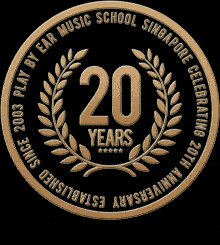Pop Piano lessons
for kids
Our Pop Piano lessons (for kids) combine fun, practicality, and strong foundational technique. Students will develop proper posture, hand positions, and fingering while also learning essential music theory and how to read notation confidently. In addition, they’ll build modern musicianship skills such as improvisation and playing by ear—both for solo performance and accompaniment. Created in alignment with the P.B.E. Syllabus™, this course offers a stress-free, interactive learning environment that nurtures creativity, musical understanding, and confidence at the piano.
Pop Piano lessons (for kids) administrative information:
Course Title: P.B.E.S™ Pop Piano Improvisation Junior Course (for kids)
Age group: 5-12 years old
Lesson duration: 45 mins one-on-one (individual)
Lessons frequency: 1 lesson per week
Prerequisite: Zero music background
Available levels: P.B.E.S™ Grade 1 – 8
Children with zero background can enroll to P.B.E.S™ Grade 1. Upon enrollment, students will receive the following:
a) P.B.E.S™ CE booklet for current P.B.E.S™ Level
b) Login ID and Password for P.B.E.I.S™ Online Student Portal APP & Whatsapp Newsfeed
c) Free usage of practice studios (Room 5/Level 3)
d) Free scores transcribing service
e) Discounts on musical instruments
Learn to play Pop Piano with the right approach
When it comes to learning piano, most students follow one of two paths: Pop or Classical. Both are excellent options, and neither is inherently better than the other. What truly makes a difference is the method of learning, not the style of music you choose. Before we introduce the details of our Pop Piano Improvisation Junior course, we encourage you to watch the two videos below. They reveal a common challenge in the way music is traditionally taught. Many students are trained to rely almost entirely on reading scores and memorizing pieces. Their focus becomes reproducing music exactly as written—rather than understanding how to create music on their own. This is especially common in the Classical route, where learning often revolves around preparing exam pieces. As long as the student can pass the exam, the learning approach—right or wrong—doesn’t ‘matter’
Consider this scenario: ask someone who has Classical Grade 8 to play Happy Birthday with both hands, without any sheet music, on the spot. Very likely, they’ll be unable to do. This points out a major issue. Music is a language, and improvisation is its spoken form. Imagine studying a language like Japanese for a decade but only being able to read it—not speak it. That’s what happens when piano education focuses solely on reading and memorizing.
It’s important to emphasize that there is absolutely nothing wrong with pursuing Classical piano, and Pop piano is not a “fix.” The issue is not the genre—it’s the approach. At PBE, we teach music as a complete language, no matter what style a student prefers. Our curriculum develops all four essential areas: reading, writing, listening, and most importantly, speaking through improvisation. This balanced approach empowers students to not only play music, but to understand, create, and express it confidently.
When it comes to learning piano, most students follow one of two paths: Pop or Classical. Both are excellent options, and neither is inherently better than the other. What truly makes a difference is the method of learning, not the style of music you choose. Before we introduce the details of our Pop Piano Improvisation Junior course, we encourage you to watch the two videos below. They reveal a common challenge in the way music is traditionally taught. Many students are trained to rely almost entirely on reading scores and memorizing pieces. Their focus becomes reproducing music exactly as written—rather than understanding how to create music on their own. This is especially common in the Classical route, where learning often revolves around preparing exam pieces. As long as the student can pass the exam, the learning approach—right or wrong—doesn’t ‘matter’
[ Click here to read more ]
Consider this scenario: ask someone who has Classical Grade 8 to play Happy Birthday with both hands, without any sheet music, on the spot. Very likely, they’ll be unable to do. This points out a major issue. Music is a language, and improvisation is its spoken form. Imagine studying a language like Japanese for a decade but only being able to read it—not speak it. That’s what happens when piano education focuses solely on reading and memorizing.
It’s important to emphasize that there is absolutely nothing wrong with pursuing Classical piano, and Pop piano is not a “fix.” The issue is not the genre—it’s the approach. At PBE, we teach music as a complete language, no matter what style a student prefers. Our curriculum develops all four essential areas: reading, writing, listening, and most importantly, speaking through improvisation. This balanced approach empowers students to not only play music, but to understand, create, and express it confidently.
The second video you’ll see was for the only purpose to show, through genuine interactions with everyday people, the reality behind our claims. Nothing in the video was scripted. It was filmed over two full days in November 2023 around Bugis, capturing honest, unfiltered responses. Of the 76 people interviewed, 22 had learned Classical piano at some point. Out of those 22, only three could still play. The rest shared that they had “lost touch.”
This brings up an important question: What’s the value of learning piano if the skill eventually fades away? Real skills stay with you. You don’t forget how to swim or ride a bicycle just because you haven’t done it in years. Music should work the same way. If you learn it as a language—one you can understand, express, and “speak” through improvisation—it becomes something you carry for life, not just something you once memorized.
You might notice that the video appears to favor Pop Piano. This is because learning Pop Piano often involves improvising with chords—something not typically taught in Classical training. As a result, Pop pianists are generally more comfortable “speaking” through improvisation. That said, choosing the wrong learning method—whether Classical or Pop—leads to the same outcome: students end up memorizing pieces rather than truly learning how to create music on their own.
As we’ve emphasized, the genre (Pop or Classical) doesn’t matter. What matters is the approach. Our focus is on teaching music as a full language: reading, writing, listening, and especially
The second video you’ll see was for the only purpose to show, through genuine interactions with everyday people, the reality behind our claims. Nothing in the video was scripted. It was filmed over two full days in November 2023 around Bugis, capturing honest, unfiltered responses. Of the 76 people interviewed, 22 had learned Classical piano at some point. Out of those 22, only three could still play. The rest shared that they had “lost touch.” This brings up an important question: What’s the value of learning piano if the skill eventually fades away? Real skills stay with you. You don’t forget how to swim or ride a bicycle just because you haven’t done it in years. Music should work the same way. If you learn it as a language—one you can understand, express, and “speak” through improvisation—it becomes something you carry for life, not just something you once memorized.
[ Click here to read more ]
You might notice that the video appears to favor Pop Piano. This is because learning Pop Piano often involves improvising with chords—something not typically taught in Classical training. As a result, Pop pianists are generally more comfortable “speaking” through improvisation. That said, choosing the wrong learning method—whether Classical or Pop—leads to the same outcome: students end up memorizing pieces rather than truly learning how to create music on their own.
As we’ve emphasized, the genre (Pop or Classical) doesn’t matter. What matters is the approach. Our focus is on teaching music as a full language: reading, writing, listening, and especially speaking.
Pop Piano Improvisation Junior P.B.E.Syllabus™
P.B.E.S™ Grade 1
Syllabus content for P.B.E.S™ Junior Grade 1
(in conjunction with P.B.E.Syllabus™)
Song 1:1 | Single root note (I)
Song: 1:2 | C chord & G chord
Song: 1:3 | Introduction to B note
Song: 1:4 | Arpeggios
Song: 1:5 | Call & response I
Song: 1:6 | Call & response II
Song: 1:7 | Call & response III
Subject: 1:8 | Music theory I
Subject: 1:9 | Rhythm training I
Subject: 1:10 | Aural training I
Objectives for P.B.E.S™ Grade 1:
- The ability to play an elementary piece of music using 2 hands
- Cultivating good piano posture
- Developing a sense of rhythm
Prerequisite for P.B.E.S™ Grade 1:
- No music background
Duration for P.B.E.S™ Grade 1:
3-6* months (depending on individual's progress) *maximum
Download Grade 1 syllabus
P.B.E.S™ Grade 2
Syllabus content for P.B.E.S™ Junior Grade 2
(in conjunction with P.B.E.Syllabus™)
Song 2:1 | Playing in unison (I)
Song: 2:2 | LH basic intervals
Song: 2:3 | RH 6th intervals
Song: 2:4 | Introduction to quavers
Song: 2:5 | F major scale
Song: 2:6 | G major scale
Song: 2:7 | Compound timeI
Subject: 2:8 | Music theory II
Subject: 2:9 | Rhythm training II
Subject: 2:10 | Aural training II
Objectives for P.B.E.S™ Grade 2:
- The ability to play in both 4 & 8 beat rhythm
- Able to co-ordinate with 2 hands
- Able to read melody and chord symbols
Prerequisite for P.B.E.S™ Grade 2:
- Able to play elementary tunes with two hands
- No chord knowledge required
Duration for P.B.E.S™ Grade 2:
3-6 months (depending on individual's progress)
Download Grade 2 syllabus
P.B.E.S™ Grade 3
Syllabus content for P.B.E.S™ Junior Grade 3
(in conjunction with P.B.E.Syllabus™)
3:1 | RH Melody
3:2 | LH root note
3:3 | LH 1+5 interval
3:4 | LH Broken chord 1-5-8
3:5 | Diatonic triads (1+3+5)
3:6 | 2 hand patterns
3:7 | Variation intervals & broken
3:8 | Ending a song
Improvisation (Choice of songs)
Grade 3 Aural training
Objectives for P.B.E.S™ Grade 3:
- The ability to interpret fake sheets and play on the piano
- Applying basic left hand patterns
- Developing hand independence
P.B.E.S™ Grade 3 Prerequisite:
- Completion of P.B.E.S.™ Grade 2
Duration for P.B.E.S™ Grade 3:
3-6* months (depending on individual's progress) *maximum
Download Grade 3 syllabus
P.B.E.S™ Grade 4
Content for P.B.E.S™ Junior Grade 4
(in conjunction with P.B.E.Syllabus™)
4:1 | Introduction to Level 2
4:2 | LH Broken chord 1-5-10
4:3 | LH Broken chord 1-5-1-3-5
4:4 | Octave displacement
4:5 | Slash chords and inversions
4:6 | LH (1-5-3-5-8)
4:7 | 2 hand pattern with m7
4:8 | Variation between 3&5 notes
Improvisation (Choice of songs)
Grade 4 Aural training
Objectives for P.B.E.S™ Grade 4:
- The ability to play in both 4 & 8 beat rhythm (with or without reading)
- Able to apply basic improvisation
P.B.E.S™ Grade 4 Prerequisite:
- Completion of P.B.E.S.™ Grade 3
Duration for P.B.E.S™ Grade 4:
3* months (depending on individual's progress) *maximum
Download Grade 4 syllabus
P.B.E.S™ Grade 5
Syllabus content for P.B.E.S™ Junior Grade 5
(in conjunction with P.B.E.Syllabus™)
5:1 | Introduction to Level 5
5:2 | The 9th note
5:3 | 6th interval RH harmonisation
5:4 | 2 hand patterns rhythmic
5:5 | 2 hand patterns fill-ins I
5:6 | 2 hand patterns fill-ins II
5:7 | Basic syncopation rhythm
5:8 | Variation interval/3/5notes
Improvisation (Choice of songs)
Grade 5 Aural training
Objectives for P.B.E.S™ Grade 5:
- The ability to interpret fake sheets with basic improvisation
- Use of right hand in playing harmony and basic fill-ins (2 hand patterns)
P.B.E.S™ Grade 5 Prerequisite:
- Completion of Grade 4
Duration for P.B.E.S™ Grade 5:
3*-6 months (depending on individual's progress) *minimum
Download Grade 5 syllabus
P.B.E.S™ Grade 6
Content for P.B.E.S™ Junior Grade 6
(in conjunction with P.B.E.Syllabus™)
6:1 | LH broken + broken
6:2 | LH broken + block
6:3 | Syncopation rhythm
6:4 | 2-hand pattern-solo playing
6:5 | Common chord progressions
6:6 | Motif application (fill-ins)
6:7 | Left hand wide playing
6:8 | Accenting on last beat
Improvisation (Choice of songs)
Level 6 Aural training
Objectives for P.B.E.S™ Grade 6:
- The ability to comfortably execute improvisation variations on left and right hand with song arrangements
- Usage of 9th notes for all major and minor triads in easy keys
P.B.E.S™ Grade 6 prerequisite:
- Completion of P.B.E.S™ Grade 5
Duration for P.B.E.S™ Grade 6:
3-6*months (depending on individual's progress) *minimum
Download Grade 6 syllabus
P.B.E.S™ Grade 7
Content for P.B.E.S™ Junior Grade 7
(in conjunction with P.B.E.Syllabus™)
7:1 | LH block 1+5+7
7:2 | LH 16th beat pattern I
7:3 | LH 16th beat pattern II
7:4 | Closing playing w intervals
7:5 | 2 hand patterns - 9th notes
7:6 | Rock patterns
7:7 | Variation - 16th beat
7:8 | Melody improvisation I
Improvisation (Choice of songs)
Grade 7 Aural training
Objectives for P.B.E.S™ Grade 7:
- The ability to play in 16 beat rhythm
- Application of maj7 , m7 and sus4
- Triplets in 8 & 16beat rhythm
- Able to improvise a song at will with or without fakesheet
P.B.E.S™ Grade 7 Prerequisite:
- Completion of P.B.E.S™ Grade 6
Duration for P.B.E.S™ Grade 7:
3-6* months (depending on individual's progress) *minimum
Download Grade 7 syllabus
P.B.E.S™ Grade 8
Content for P.B.E.S™ Junior Grade 8
(in conjunction with P.B.E.Syllabus™)
8:1 | LH approach notes
8:2 | Adv. RH harmonisation I
8:3 | V aug7, V11/13, Vb9 reharmonisation
8:4 | Advanced comping I
8:5 | Right hand fill-ins (16 beat pattern)
8:6 | Close playing using scale notes
8:7 | Voicings with 7th and 9th
8:8 | Melody improvisation II
Improvisation (Choice of songs)
Grade 8 Aural training
Objectives for P.B.E.S™ Grade 8:
- The ability to play in 16 beat rhythm with 8-beat variations
- Able to apply voice leading
- Able to improvise a melody with given chord progressions
P.B.E.S™ Grade 8 prerequisite:
- Completion of P.B.E.S™ Grade 7
Duration for P.B.E.S™ Grade 8:
3-6* months (*depending on individual's progress)
Download Level 6 syllabus
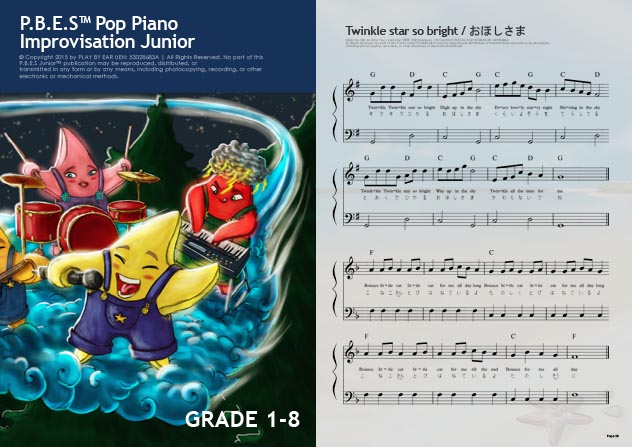
P.B.E.S™ Pop Piano Improvisation Junior course CE booklet
Updated: 12 Oct 2022 Edition 13.1
√ Added songs Come with me Page 27
√ Melody: with succession (call and response using left and right hand) C major scale notes (one octave)
√ Block chord style 1+3+5 for Junior Grade 3
√ Introducing relative major and minor triads to 2-hand patterns in Grade 4
√ Introduction of basic syncopation rhythm in Grade 5 for uptempo genres
Below is a case study example of an excerpt from the song “Sadness and Sorrow (Naruto OST)” improvised using techniques from each of the 8 P.B.E.S™ Junior Grades (Grade 1-8). The following 4 videos will give you an idea on what you will learn for every level during their piano lessons. Note: The chosen song example is random. Your child will learn the song of your choice and apply the same techniques.
This what your child should achieve by the end of P.B.E.S™ Grade 1 / 2
Techniques included (but not limited to) LH 1-5-8 | 1-5-10 Broken chord patterns | RH Single melody note | Basic ending with 9th note
This what your child should achieve by the end of P.B.E.S™ Grade 3 / 4
Techniques included (but not limited to) 16 beat rhythm | 7th & 9th notes | 3 note harmonisation | fill-ins using scale notes | voice leading
This what your child should achieve by the end of P.B.E.S™ Grade 5 / 6
Techniques included (but not limited to) broken chord patterns with 9th note | 2 hand-patterns | RH 3rd & 6th interval harmonisation
This what your child should achieve by the end of P.B.E.S™ Grade 7 / 8
Techniques included (but not limited to) rhythmic displacements | )V reharmonization | RH octave harmonization | 4-3-1 motifs
PBE students showcase
Video title: An interview with student Rene Lee and her dad Jason Lee
Rene enrolled in the Pop Piano Junior course since 2012 and completed P.B.E.S™ Grade 8. The dad explains the differences between Classical and Contemporary Piano while Rene shares her joy of being able to play her favorite Chinese songs by ear. Must watch!
Video title: Ryan Lew performing at the 2019 PBE Japan annual recital
Ryan enrolled in the Pop Piano Junior course since 2017 and completed P.B.E.S™ Grade 6. Listen to his rendition of Sparkle by Radwimps. Every year, we offer opportunities for students from Singapore to perform in Shinagawa (Japan) along side with PBE Japan students.
Video title: 2 PBE students (Jude and Alexsis) casually jamming
Alexis enrolled in the Pop Vocal course since 2015 and completed P.B.E.S™ Grade 4 while Jude (on the right) enrolled in the Pop Piano Junior course since 2014 and completed P.B.E.S™ Grade 4. Listen to their rendition!
Video title: Nanainaba performing 'River flows in you' by Yiruma
Nanainaba (student of PBE Japan) enrolled in the Pop Piano Junior course in Shinagawa since 2014 at the age of 9 and had completed P.B.E.S™ Grade 6. Listen to her rendition of ‘River flows in you’ by Yiruma in the key of A.
How is our school different from other music schools?

Exam free, zero pressure, 100% fun without compromising, and musicianship training
To put it simply, we train your child to be musicians, not ‘exam passers’. While other schools focus mostly on Classical, we teach the importance of music – to improvise and play by ear. We want your child to naturally enjoy music and be well trained musicians when they grow up.

Our teachers understand what it takes to create the rapport with your child
Our aim is to ensure that your kid enjoys playing music without stress and also without compromising on the proper playing techniques. We want your kid to practice the piano at home without being forced to. It is possible only with good rapport.

Not one fits for all. All kids react differently to different teachers.
We know how tough it is for kids to voice out. e.g. the differences in characteristics – whether animated or soft-spoken or simply unable to ‘click’. As a school, we take careful consideration in assigning the most suitable instructor for your child. As a parent, you are allowed to switch the instructor if you find him or her unsuitable.

Children don't listen to 'Mary had a little Lamb' anymore, thanks to Youtube
It cannot be further stressed how important it is, to learn and play something that your kid listens to. That is the only way they can relate. Aside from the daunting drilling and Hanon finger exercises, which we cannot deny are beneficial to every pianist – ultimately your child should be playing the songs of your choice. ![]() Learn more
Learn more

Hollow prosperity do NOT motivate us.
Money isn’t our passion.

Invitation to perform at our annual student recitals: locally or in Shinagawa (Japan)
Every year, there are 2 annual student recital concerts. One is held in Singapore and the other is held in Shinagawa (Japan) – 5 Chome – 18 – 1 Higashioi, Shinagawa-ku, Tokyo-to 140 – 0011. We showcase our students of all ages, even complete beginners.
How are the piano lessons conducted?
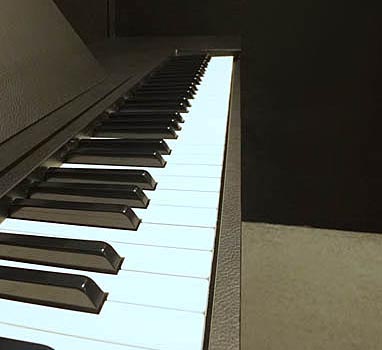
Your child would select a song in accordance with your P.B.E.S™ level, while your teacher provides the ‘stripped-down’ scores (fake sheets), consisting of the melody and chords only.
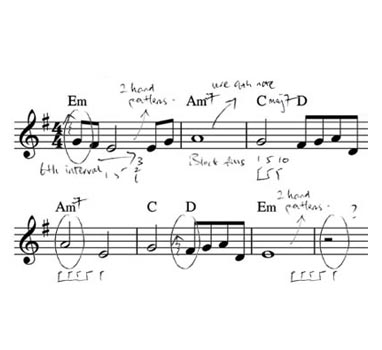
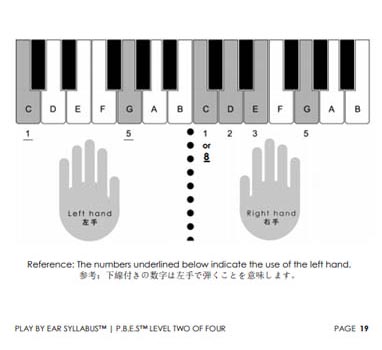
Local & International celebrities / guest artistes / music collaborators
FAQ about time slots:
You may sign up online or at our school physically or via whatsapp at 91798110.
45mins. 1 to 1.
1130am & 83opm for weekdays and 11am & 715pm for weekends
When you postpone a lesson, you gain a makeup lesson which has a 6mths expiry. In brief, you need to give 3 days advanced notice and 1 day advanced notice for peak and off peak lessons respectively.
No, we do not conduct group lessons for children.
Please whatsapp us at 91798110, as our schedule changes every other day.
Send us an email, we should be able to work out something for you.
Yes, it is possible (subject to availability). Just let us know as soon as possible.
Other FAQ:
Our trial lesson (45mins) is payable at $72.
We highly recommend your child to have at least a ‘weighted-key’ keyboard or digital piano.
Our materials are not for sale to the general public.
It does not matter which part of the month you register and commence your first lesson, as school fees will be fairly prorated accordingly.
Your school fees will be prorate accordingly.
Yes, but only for the 1st lesson or trial lesson.
